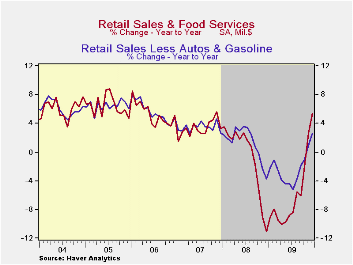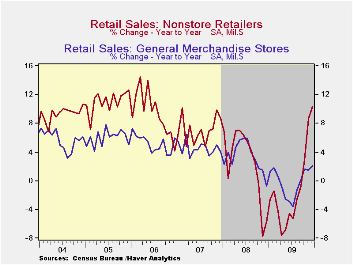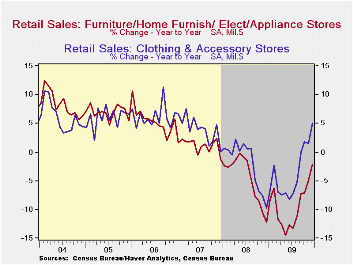 Global| Jan 14 2010
Global| Jan 14 2010U.S. Retail Sales Weaken At Yearend But 2009 Improved
by:Tom Moeller
|in:Economy in Brief
Summary
d less evident at the end of last year's holiday shopping season. December retail sales slipped 0.3% last month though the November increase was revised up to 1.8% from 1.3% reported last month. The latest figure was weaker than [...]
 d less evident at the end of last year's holiday shopping
season. December retail sales slipped 0.3% last month though the
November increase was revised up to 1.8% from 1.3% reported last month.
The latest figure was weaker than Consensus expectation for a 0.5%
rise. Reinforcing the notion of a weak end to 2009 was a 0.3% decline
retail sales less autos after an upwardly revised 1.9% jump in November
sales. Aside from the monthly volatility, however, the trend in retail
spending improved. On a three-month basis, retail sales rose at an
11.3% annual rate through December, by far improved from the 29.7% rate
of decline one year earlier. Less autos, the rate of spending also
recovered to 7.1% from negative 28.9% at its depths.
d less evident at the end of last year's holiday shopping
season. December retail sales slipped 0.3% last month though the
November increase was revised up to 1.8% from 1.3% reported last month.
The latest figure was weaker than Consensus expectation for a 0.5%
rise. Reinforcing the notion of a weak end to 2009 was a 0.3% decline
retail sales less autos after an upwardly revised 1.9% jump in November
sales. Aside from the monthly volatility, however, the trend in retail
spending improved. On a three-month basis, retail sales rose at an
11.3% annual rate through December, by far improved from the 29.7% rate
of decline one year earlier. Less autos, the rate of spending also
recovered to 7.1% from negative 28.9% at its depths.
Higher
gasoline prices obviously played a part in the retail sales picture.
Gasoline purchases rose 1.0% last month and they're up by one-third
from last year.  Yet without gasoline there still has been firming in
spending. Less autos & gasoline retail sales fell 0.3% last
month after a 1.0% November jump. On a three-month basis, these sales
rose at a 3.1% rate, up from the worst of -12.2% at the end of 2008.
Yet without gasoline there still has been firming in
spending. Less autos & gasoline retail sales fell 0.3% last
month after a 1.0% November jump. On a three-month basis, these sales
rose at a 3.1% rate, up from the worst of -12.2% at the end of 2008.
It's been internet & catalogue purchases that have shown the bulk of the improvement in retail spending. These sales rose 1.4% in December (10.3% y/y) after similar increases during the prior three months. The three-month rate of gain rose to 21.2% from a negative 22.5% at the end of 2008.
Motor vehicle sales slipped 0.8%
last month after a 1.2% November increase and a 7.4% October gain.
Reflecting price discounts, these changes lag the increases in unit
vehicle sales. Elsewhere, discretionary "core" spending improved some
but  it's been less pronounced. Sales at furniture & appliance
stores fell 1.2% during December (-2.2% y/y) after a 1.8% November
increase. The three-month rate of growth improved to -0.9% from -25.9%
at its worst. Sales at furniture stores alone rose 0.3% after a 0.7%
November gain and three-month growth improved to 0.3% from -21.6% at
its worst. Sales of electronics & appliances fell 2.6% (-0.7%
y/y) and reversed all of the November increase. Three-month growth
slipped to -2.0%. In soft goods, apparel store sales slipped 0.6%
(+5.0% y/y) for the third consecutive monthly decline. General
merchandise store sales fell 0.8% (+2.1% y/y) while three-month growth
improved to 1.7% from -11.2% at its worst late in 2008.
it's been less pronounced. Sales at furniture & appliance
stores fell 1.2% during December (-2.2% y/y) after a 1.8% November
increase. The three-month rate of growth improved to -0.9% from -25.9%
at its worst. Sales at furniture stores alone rose 0.3% after a 0.7%
November gain and three-month growth improved to 0.3% from -21.6% at
its worst. Sales of electronics & appliances fell 2.6% (-0.7%
y/y) and reversed all of the November increase. Three-month growth
slipped to -2.0%. In soft goods, apparel store sales slipped 0.6%
(+5.0% y/y) for the third consecutive monthly decline. General
merchandise store sales fell 0.8% (+2.1% y/y) while three-month growth
improved to 1.7% from -11.2% at its worst late in 2008.
The retail sales data are available in Haver's USECON database.
The Federal Reserve's most recent Beige Book covering regional economic conditions an be found here.
| December | November | October | Y/Y | 2009 | 2008 | 2007 | |
|---|---|---|---|---|---|---|---|
| Total Retail Sales & Food Services (%) | -0.3 | 1.8 | 1.3 | 5.4 | -6.0 | -0.8 | 3.3 |
| Excluding Autos | -0.2 | 1.9 | -0.0 | 5.2 | -4.7 | 2.4 | 3.9 |
| Non-Auto Less Gasoline | -0.3 | 1.0 | 0.1 | 2.3 | -1.8 | 1.6 | 3.6 |
Tom Moeller
AuthorMore in Author Profile »Prior to joining Haver Analytics in 2000, Mr. Moeller worked as the Economist at Chancellor Capital Management from 1985 to 1999. There, he developed comprehensive economic forecasts and interpreted economic data for equity and fixed income portfolio managers. Also at Chancellor, Mr. Moeller worked as an equity analyst and was responsible for researching and rating companies in the economically sensitive automobile and housing industries for investment in Chancellor’s equity portfolio. Prior to joining Chancellor, Mr. Moeller was an Economist at Citibank from 1979 to 1984. He also analyzed pricing behavior in the metals industry for the Council on Wage and Price Stability in Washington, D.C. In 1999, Mr. Moeller received the award for most accurate forecast from the Forecasters' Club of New York. From 1990 to 1992 he was President of the New York Association for Business Economists. Mr. Moeller earned an M.B.A. in Finance from Fordham University, where he graduated in 1987. He holds a Bachelor of Arts in Economics from George Washington University.






